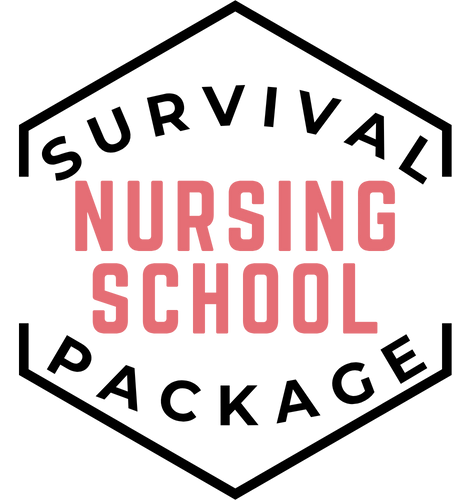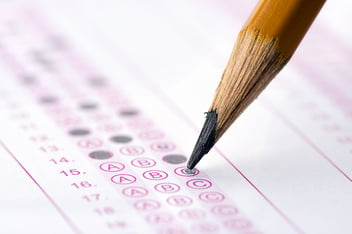How to Stop Being a BAD Test Taker in Nursing School (struggling student) | NURSING.com

Currently I’m struggling with test taking and second guessing my answer choices. Although I have improved, I continue to second guess myself. Every time I check my answers, my first choice was always the right one. When taking exams I’m left with two obvious, good choices. Although my brain tells me the first one was right, my pen or mouse picks the second. Any tips on how to overcome this would be a great help.
Not passing the NCLEX® (or any exam for that matter) does not always mean that you have not studied enough. Sometimes, it can be because you have spent so much time studying that you forgot to prepare YOU – the person who’ll be taking the exam!
What do I mean by that?
You and YOU Against the Test
On the day of your exam, it is YOU who will be taking the test.It is just YOU vs. the exam. That’s it!
Okay, perhaps it would be fairer to also mention the proctor or professor in the background; but for real, when it comes to getting the correct answers, YOU ARE ON YOUR OWN!
Now, don’t take that the wrong way because you can certainly work that to your advantage. That’s the key reason why you should not be caring about other test takers, the clock, and whatever else you have going on in your life. Make it a point to only focus on answering the exam questions as best as you can. An exam is meant to be savored, made sweet, sweet love to if you will, and handled like a pro…but how?
Listen To That Squeak!
Have you ever experienced being drawn to an answer but have no idea whatsoever why or how? Just got this strong feeling that an answer is the right one but not really understanding why your brain is telling you to go ahead and pick it?
What usually happens next is you end up rationalizing with yourself, picking another option, and then it turns out that your hunch is the correct answer all along! So, so unfair!
That sounds all too familiar isn’t it?
Want to know how or why that tiny voice is your head often ends up being correct? How can something so weird like that happen?
Chances are, you have already answered a similar question before or have read a concept that applies to it in your years of studying. It’s just that you cannot consciously remember it at the top of your head and so you usually end up choosing another option after much thinking, err rationalization.
If you’ve seen the animated movie, Inside Out, they do kind of show in there (in a very neat way!)how memories are stored and accessed. Call it instinct, guts, divine intervention, or your fairy godmother whispering in your ear – that little squeak is the real thing!
#ThatFeelingTho
When you start to try to ignore that little tug drawing you to the correct option, don’t you sense a nagging feeling redirecting you to go back to that option again? That is because your brain is trying to tell you that you’re heading to the wrong direction!
I’ve said that it is you and YOU who’ll be taking your exam. You have to learn to listen to yourself and give yourself some credit. Just like how you don’t need to measure ingredients when you’re cooking your favorite dish because you know it so well, there will be times that you’ll be drawn to the correct option without really thinking about it; and that is because it is so freakin obvious that your brain was just saying, “duh dude, here’s the answer!”

Now that we’ve got that out of the way, here are some more tips for successful test taking:
The 10 Commandments of Successful Test-Taking
#1 – Thou shall not use your study time in vain.
If you’ve set time to study, then take a seat and try to go over your notes. This would be much better if you’re relaxed but believe it or not, passive studying and repetition does work so hands-off your mobile and keep reading/studying!
#2 – Thou shall not ignore keywords.
Nursing questions are littered with keywords. Words such as EXCEPT, SATA, and NOT are often used and yes, also often missed thus leading to incorrect answers. It really is not enough to have just knowledge to pass a test, you’ll have to understand what is being asked in the first place.
#3 – Thou shall not cheat.
Some professors would use the same exam for all the classes that they’re handling. This is not an excuse to get a free pass. Remember that the exam is your tool to gauge how much you’ve learned, retained, and understand.
#4 – Thou shall honor your first answer – always!
This is one of the best nursing student hacks ever! You must listen to the squeak! That tiny little voice that points you to the correct answer even when you have no idea how come that answer is the right one is your lifesaver!
#5 – Thou shall not steal glances at the clock while reading questions.
You really should stop torturing yourself by NOT looking at the clock while answering questions! Being mindful of time is fine, but being consumed by how much time you are taking answering each question is a no go.
#6 – Thou shall not kill time dawdling between options.
In fact, you should not even be going back and forth between options (except maybe if it’s a SATA-type question). Going back and forth between options for a considerable length of time only serves to confuse you further and tire you out, thereby making you more likely to choose the wrong answer!
#7 – Thou shall remember to take a break.
Here’s what you do when you find that choices seems to be blurring together or that questions are not making sense. Take a deep breath and take a mini break. It can be as short as 30 seconds thinking of a pleasant thought but it will definitely be worth it!
#8 – Thou shall not look unto your neighbor’s answers.
And thou shall not be bothered by your neighbors AT ALL! Cheating is for losers and you’ll not be doing yourself any favor if you do that nor when you look around trying to figure out who’s done with the exam and who’s still soldiering on with you. Really, don’t do it!
#9 – Thou shall pass the exam.
Well, how else would we know that you’ve become a good test taker other than by passing your exam?
#10 – Thou shall remember that an exam is just an exam.
There will be instances when you will not get things right and that’s fine. Being a nurse means having to contend with a lot of challenges, some of which may be extra difficult to swallow than the rest. There will be times when you think you’ve given an exam your 100% and have it totally betray you(how dare the test do that, right?!). Part of being a good test taker is developing a nurse’s mind and learning to pick your fights.
May ‘The Force’ Be With You
Accept that some things are not meant to make sense right away. As you continue in your nursing journey, you’ll begin to recognize and give value to your inner voice. ‘The Force’(that’s a Star Wars reference, btw) that’s pulling you to the correct answer is your newfound Jedi-ness peeking through. Learn to embrace it and use it for the good of mankind to pass any exam that comes your way! That’s the ultimate trick to stop being a bad test taker, the 11th commandment: Thou shall not doubt yourself, EVER!
No amount of knowledge and notes will help you pass that test if you don’t believe in YOU. There is no room for errors in real life nursing and the test is designed to sort of simulate that. The key is being as confident in answering your exam questions as you are being an awesome nurse!
Want to connect with likeminded nurses? Then join our ever growing NURSING.com community!
Dealing With Anxiety During Nursing School Exams
Want to know how to deal with test anxiety in nursing school? We can help you get past the stress and help you feel confident in your test taking abilities! Listen in with Kati Kleber for dealing with that anxiety. When all of the answers are correct answers… it might be a nursing school exam! #nursingfamily
Absolute Words |Tuesday Test Tip
How to answer Absolute Words NCLEX style questions . . . things like:
- always
- never
- none
- all every
Happy Nursing!
Podcast Transcription
What’s up guys. My name is Jon Haws, RN CCRN within our sng.com where our goal is to give you the tools and the confidence that you need to succeed in nursing school on the in clicks and in your life as a nurse to help you succeed on this journey. We’ve created weekly cheat sheets that we send to you every single Friday to sign up at over to nrsng.com/freebies that’s interesting. [inaudible] dot com slash freebies and every single Friday we’ll send you a cheat sheet on pediatrics, OB, med surge, mental health, ICU, critical care, every single aspect of nursing care to help you succeed. That’s nrsng.com/freebies all right, now let’s roll into the show.
What’s up people? Welcome to the podcast. Today I’m talking about how to deal with anxiety in nursing school exams. My name is Katie Kleber. Thank you so much for joining me, so I felt like myself. This was something I talked to people about. But the more I’ve been online and the more I’ve met other nurses that have gone through the new graduate nurse process, a lot of us struggle with anxiety. But I don’t think a lot of us want to say anything about it because we’re nurses and we’re not supposed to be anxious. We’re supposed to be cool, calm, collected. And being anxious is not something typically synonymous with nursing. And I honestly thought if I’m anxious I can’t be a good nurse and I just need to experience stuff more so I don’t be anxious and worried. Well not the case. And I felt like I had a lot of anxiety in nursing school specifically.
So I’m going to, I’m going to talk about anxiety with nursing school exam specifically. Anxiety is a huge, a huge topic and it can um, translate into depression. It can be related to a lot of things. And I want, I want to focus specifically on this because it’s such a big topic. So I’m going to focus on like you know, you know, anxiety is such this big topic. I’m going to focus in on anxiety in nursing school related to exams for this podcast specifically because I think we could talk for a really, really, really long time about just this topic in general. All right, so let’s, let’s say you suffer from anxiety and you’ve got nursing school exams and you freak out about them. Well I get it. Uh, I feel your pain. So I’m going to talk about a couple things that are really important to consistently do.
So one of the most important things I think when you suffer from and have and deal with anxiety on a regular basis is preparation. We cannot, I cannot over S over explain how important appropriate preparation is for nursing exams. And let’s just take out that anxiety piece. Like if you aren’t prepared for these exams, the second you see those questions, you’re going to get anxious because you don’t know what to do. So we have some resources available to help you kind of prepare for exams there. You know, one of the most important things is to prepare when you’re going to study, understand all of the exams and deadlines because there’s quite a few and making sure your preparation includes, not just reading, getting through, reading assignments, but understanding those reading assignments. So going from basic comprehension to truly understanding and applying those concepts. So if you can do that and prepare appropriately, you know, your mindset is a lot better.
Your understanding is much deeper and very not superficial. Um, a lot of my previous exams and, and S in classes that were not related to nursing, my prerequisites, I could study the night before or maybe two nights, two nights before and that would be enough. But it’s not like that in nursing school. So you gotta be ready for what’s ahead consistently, you know, make sure that you prepare for those exams. Another thing that’s really helpful for anxiety with nursing school exams, and I know this sounds kind of hokey, but I promise it’s not meditation. Meditation actually when you do it, maybe two twice a day for 10 minutes and it’s not very long. But if you can do that, maybe when you wake up or when you’re going to bed, it lowers your anxiety threshold. That’s like science. That’s not me just fluffing around about that. No, truly you’re lowering your anxiety threshold by doing some meditation.
So if you can do that in the morning and at night, that can make such a big difference. If you’re diligent with it, I want to encourage you to try it for a week and see if that helps. Um, and one thing I like to do personally is some yoga that helps me kind of breathe and focus and that can really lower your anxiety and does lower my anxiety threshold. So if you can get, you know, there’s a lot of great YouTube videos that are free. I like Yogi yoga with Adrian on YouTube. It’s free, she’s great. Get some 10 minute ones are easy, that are really helps you kind of calm down. And also when you’re within those exams, start to feel yourself getting anxious. You can go back to the breathing that you really are familiar with during that, um, meditation or that yoga experience so that you go back to that and it enables you to breathe and focus in on the task at hand.
Another thing that’s helpful is to make sure if it’s truly something you really do struggle with and you’re, you need someone else to know about it because if you experience a panic attack, you want someone in your clinical environment and in your classroom environment to be able to recognize that and get you where you need to be, if that makes sense. Whether that’s helping remove you from that environment and supporting you in the hallway, in the bathroom, helping you get your medication if you need that. Um, so that’s really, really important to do. So I would encourage you to have a person in both the clinical setting and the classroom setting because you may be with different groups of people. Um, so I actually asked some people online about this and someone said to me, I tell my clinical instructors that I have anxiety at the beginning of each rotation so that they’re aware and a little more understanding if I need some, an extra second to answer questions.
And if my heart and mind are racing, it is a lot harder for me to concentrate when being quizzed while completing a task or preparing medications. This helps them understand that if I need a second, it isn’t because I don’t know the answer. It is because I need a second to breathe and bring my heart rate down. The last thing I want is someone getting frustrated and attacking me with a ton of questions. When my heart is racing faster each second my face is burning red and I can hardly concentrate on what they’re saying, let alone spit out a coherent answer. I have gotten to the point where I can now say I just need a minute and they give it to me, no question to ask and it really helps calm me down. So I think that’s really important. Communication is key. Um, a lot of people, you, maybe you think that other people because it’s so present in you that others will be able to pick up on you being anxious.
But a lot of people are Brady, you know, don’t notice that stuff well or you may be much better at concealing it, um, than you realize. So maybe not people around you may not realize that you need a little time, that you need help, that you need a little bit, a little a second to answer a question or you need some support or whatever. So communicating before things happen is key. So letting your clinical instructor know is really important. I think your professors should know as well. You know, if you’re in the middle of an exam and that’s happening in your are truly having maybe a panic attack and you need to exit the room, but they’re very staunch on don’t leave the room, you know, they need to understand that you need to be able to do that. So it’s a lot easier to communicate that beforehand than in the moment.
So if you know that no matter where you are in nursing school, there is someone in that room that understands this struggle that you have and they know that when they, you need to be supported, it helps you relax more because you know somebody’s got your back. So I encourage you to do that. Another thing, um, with nursing school tests and anxiety is to get enough sleep. You know, someone else that I was asking about this, they said a tired me is me with more anxiety. And if you are having exams, you want to be at the top of your game. So that means that you can’t stay up late then I, before you got to make sure you get an sleep. So that must mean that you have to plan when you’re going to study so that you’re not forced to stay up late to study, to understand the information that you’ve allocated enough time throughout your day or throughout your week before this exam so that you’re not the night before 11th hour studying all night.
It’s important to get enough sleep. Um, make sure too that you have, if you need to, um, touch base with your physician and let them know, Hey, I’m going through nursing school, like this is going to be a very, um, stressful and, and potentially make me more anxious. Is there anything specific you recommend they may recommend? Consistent counseling sessions, um, maybe monthly, biweekly or something like that. Um, to help identify maybe some specific coping techniques for in the moment stuff, um, or go over some certain situations. You know, there might be a lot of trial and error and figuring out what works for you. So working through that with a professional, um, I can’t overestimate how our over explain how important that is. And also too, you’re going through nursing school knowing that at the end of nursing school you’re going to have to sit for the end clicks, the big board exam.
So you want to be able to prepare yourself consistently throughout school so that when you sit down for the end Clegg’s that you have your anxiety controlled to a, uh, a degree that you’re able to sit there and, and take that test successfully. So that’s really, really important. Um, and if you have really bad test anxiety, I really, not just generalized anxiety but just anxiety specific to nursing school tests. I think it’s really important to communicate that to your, um, communicate that to your professors. So I, I um, I also asked somebody else about this and I want to give you, tell you specifically exactly what they said. I have really bad test anxiety and as suggested by a psychologist, once I review every test and quiz, it helps me because I can see where I made stupid mistakes and I can see if my errors were, were knowledge gaps or just me reading the question too fast or not being able to concentrate properly because of an attack.
Knowing this helps me be able to calm down a bit better before tests and even during if I know my mistakes are not knowledge gaps, I can run mine myself that I know this information and if I breathe and I will have the ability to think clearly and get to the right answer if it is a knowledge gap, I just study a ton and I’m convinced I am prepared and that also helps me, um, just tell myself that I’ve done as much to prepare that I could and I couldn’t really have done more to get prepared. Most professors or universities are pretty strict about test reviews, but I just tell them that I have anxiety and reviews help me and they’re typically eager. You’re eager to help. I swear by reviews, I always do. Right? I always do all right on my first, but once I see what the professor is looking for and where and why I made mistakes, I do much better on the next ones.
My very first nursing midterm in school, I got a 57% not even close to passing. I went for a review and got 87% of my next one. It has worked so far throughout my three years of nursing and have been able to ACE most of my classes. So that’s an example, anonymous example, but of someone that figured out what worked for them and communicated, reviewed, um, and if you know, you can’t hurt to ask, it absolutely cannot hurt to ask if you can do this. You stand so much to gain, so much to gain. And what’s the worst they’re gonna say no. So a, not every school is going to let you do this. I would hope many would, but this may be another very real practical way to help you get through these exams and really not only just get through them, but truly learn the information so that you are more prepared for the [inaudible], more prepared for patient care and finally more prepared to take care of patients as a registered nurse. So thank you guys for listening. Um, anxiety does not define you as a person or as a nurse, whether it’s preparing for nursing during your post-graduation or on the job. Remember it does not define you from being fantastic. You work your butt off to help your plate patients, so please make sure you’re doing the same for yourself, so thank you guys. Stay well.
All right. All right. All right. I hope that was helpful today. Guys. I hope that gave you some motivation, some inspiration to go out and to be your best self, to go out and to become the nurse that you want to be, to make a difference and to do the best work that you can. Listen, we’re here to help you along your way@interestsandge.com our goal is to give you tools, incompetence to help you in nursing school on the in clicks and in life. One of those tools we created is our Friday freebies, these weekly PDF cheat sheets that you can refer to on the clinical floor in the classroom and just throughout your entire career as a nurse. To get these cheat sheets head over to nrsng.com/freebies that’s nrsng.com/freebies you guys, if you need anything, we’re here for you. You can reach out to us on social media or via email@contactatnrsng.com we want you to succeed. We want to help you along the way. We’re here to hold your hand. We’re here to give you the tools, the confidence that you need to achieve success in this journey to nurse, or as you guys know what time it is now, it’s time to go out and be your best self today. Happy nursing.






